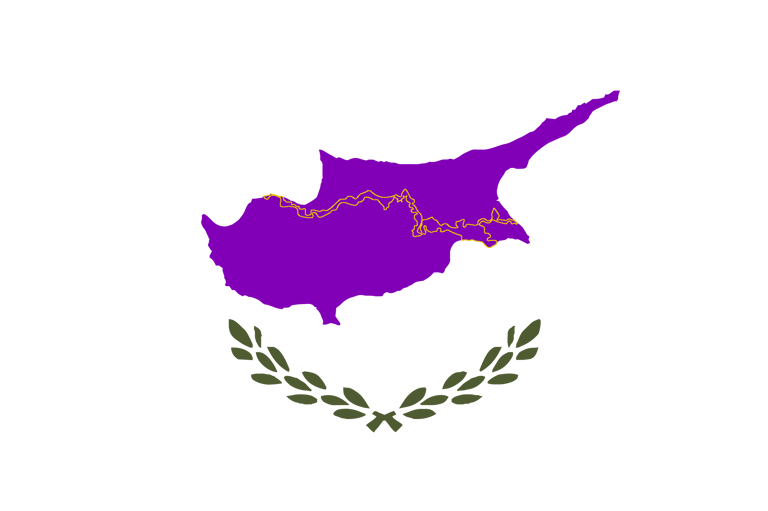The 1960 Treaty of Coerced Establishment
These colonies don't even behave on their own terms, let alone international law


The 1960 Treaty of Establishment—a living legacy of colonial coercion—grants Britain indefinite control over Cypriot land through the Sovereign Base Areas (SBAs), perpetuating militarism, resource theft, and systemic discrimination. Framed as a “compromise” for Cypriot independence, the treaty entrenches colonial power structures that violate international law and deny Cypriots their right to self-determination. These lingering structures enable the SBAs operate as tools of modern imperialism.
Key unresolved issues include:
The UK’s unilateral military use of SBAs.
Environmental and human rights violations.
The democratic exclusion of Cypriots from SBA governance.
Key Provisions of the Treaty
1. Territorial Sovereignty: The territory of the Republic of Cyprus (RoC) includes the island of Cyprus and its surrounding islands, except for the two areas known as the Akrotiri Sovereign Base Area and the Dhekelia Sovereign Base Area, which remain under British sovereignty.
2. Military Rights: The United Kingdom retains specific rights to use military bases in Cyprus, including the right to operate freely within designated sites and to conduct military training exercises. The UK authorities are granted the right to police these areas and maintain security, with the cooperation of the RoC.
3. Property Rights: The treaty outlines the rights of the UK to acquire and use immovable property in Cyprus, subject to the laws of the RoC. The UK is required to notify the Cypriot government of any property acquisitions and must consider local needs in its operations.
4. Financial Arrangements: The treaty includes provisions for financial and administrative arrangements to settle questions arising from the termination of British administration in Cyprus. This includes the transfer of international obligations from the UK to the RoC.
5. Human Rights: The RoC is committed to securing human rights and fundamental freedoms for all individuals within its jurisdiction, in line with international standards.
6. Dispute Resolution: Any disputes regarding the interpretation of the treaty are to be settled through negotiation or, if necessary, by a tribunal composed of representatives from the involved parties.
7. Exemptions and Jurisdiction: Members of the UK armed forces and their dependents are granted certain exemptions from local laws, including immigration regulations, while also being subject to the jurisdiction of their own military laws for specific offenses.
8. Training Areas: The treaty designates specific areas for military training, including provisions for the use of these areas while ensuring minimal disruption to local communities.
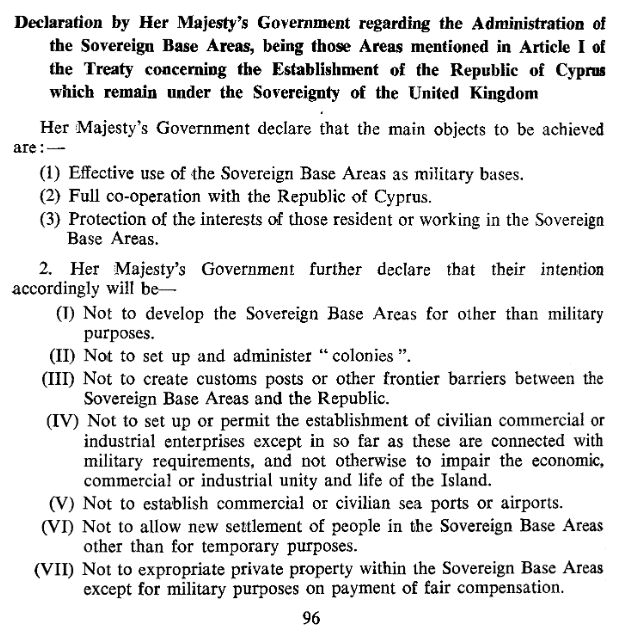

Military Use and Expansion
The treaty stipulates that the SBAs should be used solely for military purposes and not developed for other uses. However, there have been instances where the UK has expanded its military presence and infrastructure beyond what was originally agreed upon, which contradicts the intention of the treaty to avoid establishing "colonies" or civilian commercial enterprises in these areas.
Treaty Myth: SBAs are for “defensive purposes”. Colonial reality:
Akrotiri Airbase has become a NATO launchpad for U.S./UK wars in Syria, Libya (Kathimerini Cyprus, 2023), Iraq, Yemen, Palestine and beyond. Declassified UK (2023) exposed its role in surveilling Mediterranean refugee routes to enforce Fortress Europe’s borders.
UK shares SBA-collected intelligence with Israel, which Cyprus claimed undermined its sovereignty and breached Article 3’s consultation clause.
Ayios Nikolaos Station, expanded to support broader US/UK military campaigns without Cypriot consent for signals intelligence (SIGINT) operations, spies on Middle Eastern oil pipelines and governments—serving corporate interests, not Cypriot security.
Anadolu Agency (2023) accused the UK of permitting Israeli military exercises in SBAs, claiming these operations destabilized regional security and violated Article 1’s restrictions.
SBA personnel exploit migrant workers, legally determined 'domestic dependants' who are controlled by their 'employer'. Abuses of these vulnerable women are covered up, favouring the image of the soldiers over justice.

Treaty Myth: Article 3 (consultation with Cyprus on external activities) emphasizes the importance of collaboration among the parties involved in matters concerning the defense and security of Cyprus, ensuring that the RoC is included in discussions related to external activities that may affect its interests. Cyprus Mail (2020) noted US military vessels docking at Akrotiri without prior Cypriot approval, breaching Article 3’s consultation requirement.
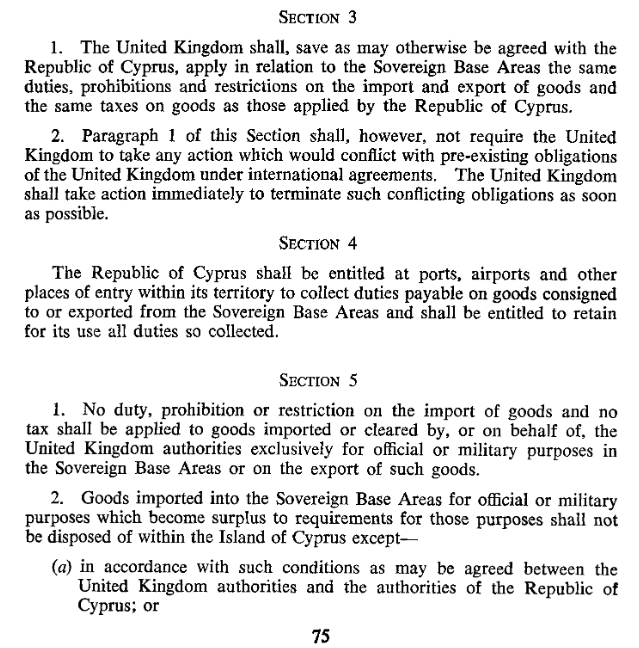

The treaty outlines that customs barriers between the SBAs and the RoC should be avoided, and that the UK should apply the same duties and taxes as those in the Republic. However, there have been reports of the UK authorities applying different customs regulations that favour their military operations, which undermines the economic unity intended by the treaty.
Treaty myth: Customs barriers between SBAs and Cyprus are prohibited.
Colonial reality:
Britain imposes tax exemptions for military contractors in SBAs, undercutting Cypriot businesses.
UK-backed high-powered antennas and solar farms privatize stolen land for profit, violating the ban on commercial exploitation. In 2023, the SBA administration approved commercial ventures (e.g., renewable energy projects) leased to private companies without Cypriot approval in Akrotiri, raising questions about compliance with Article 4(3). Cypriot landowners have protested over the UK’s alleged seizure of civilian land for non-military projects (e.g., telecom infrastructure) without compensation.
Customs and Trade Regulations
Environmental Warfare: Ecocide as Colonial Policy
The treaty includes provisions for joint management of resources, such as water, between the SBAs and the RoC. However, there have been concerns regarding the unilateral decisions made by the UK regarding resource extraction and environmental management, which have not involved adequate consultation with Cypriot authorities.
Treaty myth: The UK must protect SBA ecosystems.
Colonial reality:
Akrotiri Salt Lake, a Ramsar-protected wetland, is poisoned by munitions waste, jet fuel leaks and high-powered antennas with flamingo populations close to extinction.
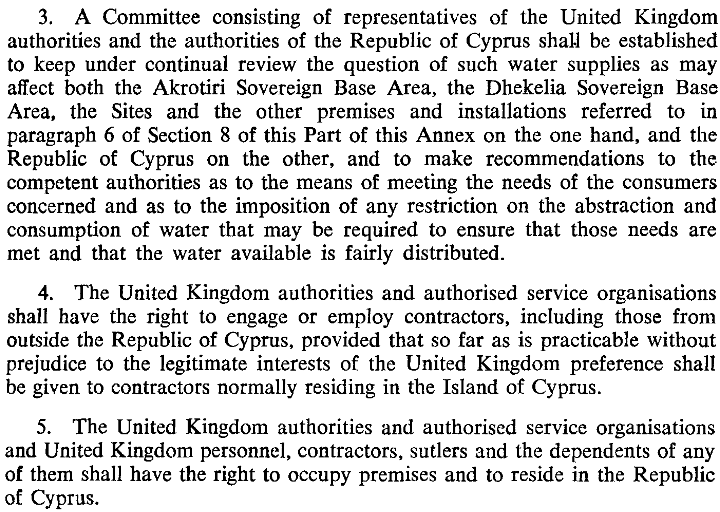

Toxic waste dumping by UK forces in Akrotiri’s coastal areas, damaging marine ecosystems. Cypriot environmental groups cited Annex B violations, which happens consistently.
Katherimini reported wall being built. Environmental groups cite breaches of coastal protection laws as British Bases face criticism over oversight and permitting practices.
UK military exercises ignite wildfires in Troodos forests, destroying ancestral farmland. Locals accused the SBA administration of failing to conduct adequate environmental impact assessments.
Boreholes over-extracting 3.8 million m³ annually from coastal aquifers, while water-usage compromises are forced upon local agriculturalists.
Illegal bird trapping is concentrated at Dhekelia, where aover 4.5 km of netting—enough to trap 15,000 songbirds annually—now lines migration corridors, reflecting enforcement failures.
Resource Apartheid
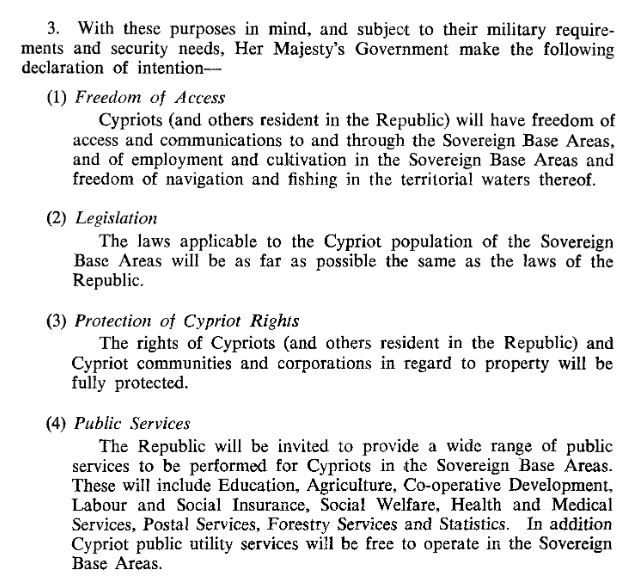

Xylotymbou villagers, displaced by radar installations, face UK courts that rubber-stamp land theft.
Asylum seekers are detained in SBAs as part of Britain’s racist border regime, a non-military misuse of the bases (Demetriou, 2023).
Limited rights to land-use management by the Cypriot communities who live within the SBAs.
In exchange for the SBAs, the UK is supposed to grant financial assistance very 5 years, and yet, pay nothing.
The treaty emphasizes the protection of the rights of Cypriots residing in the SBAs, including access to public services and legal rights. Nevertheless, there have been allegations that the UK authorities have not fully cooperated with the RoC in providing these services, leading to a lack of adequate support for the local population.
Treaty myth: Rights of Cypriots in SBAs are protected.
Colonial reality:
Turkish Cypriots in Pyla endure crumbling roads and denied healthcare, while UK authorities prioritize other complaints (Daily Sabah, 2023).
International Law vs. Colonial Hypocrisy
The treaty’s architecture violates fundamental norms:
Self-determination: Imposed under duress, the treaty contradicts the UN’s 2019 Chagos ruling, which affirmed that colonial land grabs are illegal.
Peoples have the right to freely determine their political status (ICCPR, Article 1). The treaty was signed under pressure during decolonization, with Cyprus forced to accept SBAs as a condition for independence. Vienna Convention on the Law of Treaties (VCLT) Article 52 dictates treaties procured by coercion are void.
States have sovereignty over their territory (UN Charter, Article 2(1)).
Effectively partitioned Cyprus at independence, creating a permanent foreign military presence without full Cypriot consent. Legal scholars like James Crawford argue this undermines Cyprus’s territorial integrity, a cornerstone of international law.
The lack of a termination clause perpetuates colonial-era control, conflicting with the post-1960 evolution of self-determination norms (e.g., UN Resolution 1514 on decolonization). The lack of a Cypxit mechanism (to exit the treaty) conflicts with evolving self-determination standards, rendering it voidable under VCLT Article 56.
The SBAs’ governance, as a military dictatorship, excludes both Greek and Turkish Cypriots who reside in their territory, perpetuating a democratic deficit incompatible with modern human rights law.
The UK’s expropriation of land without adequate compensation (e.g., Xylotymbou village) violates ECHR standards, as highlighted in ECtHR cases like Loizidou v. Turkey (1996).
Environmental degradation in SBAs (e.g., Akrotiri Salt Lake pollution) breaches the UK’s obligations under the Bern Convention and EU habitats directives, despite Annex B of the treaty.
War Crimes: NGOs like 'Reprieve' argue SBAs facilitate extraterritorial abuses, such as U.S. drone strikes enabled by UK bases, raising complicity concerns under the Rome Statute. Using SBAs to gather over-the-horizon intelligence, refuel fighter jets and logistical assistance to the IOF constitutes complicity in genocide (Article 3(e) Genocide Convention) and aligns with the prohibition of ‘aid or assistance’ to a State committing a wrongful act under Article 16 of the Articles on the Responsibility of States for Internationally Wrongful Acts (ARSIWA) (ICJ, 2007 Judgement, para. 420). Legal experts argue persistent breaches could challenge the treaty’s legitimacy under international law.
In the Chagos Archipelago Advisory Opinion (2019), the ICJ ruled that colonial-era territorial arrangements undermining self-determination are illegal. While not binding, this sets a persuasive precedent for re-examining the SBAs.
As AKEL declares; “The SBAs are not a ‘tradition’—they are colonialism. Their eradication is a prerequisite for Cypriot liberation.”
WE DEMAND;
Immediate withdrawal: Evict British forces. Transfer SBA land to Cypriot cooperatives, without provision to lease to foreign nations.
Reparations: Compensate displaced families and fund ecological restoration.
Global Solidarity: Boycott British arms firms profiting from SBAs. Pressure the ICJ to condemn the treaty.
